Darryl Edwards's Blog, page 3
December 3, 2024
Movement Advent 2024 Day Four

Movement Advent 2024 - Fun Daily Movement
Primal Play Method Movement Advent – Day 4Crouch to Stand (Keep It Loose Version)Welcome to Day 4 of our 24 Days of Movement Advent(ure)! 🎄
Today, we’re taking a playful leap into a movement that’s as fluid as it is functional: Crouch to Stand (Keep It Loose Version). This snacktivity is a perfect way to energise your body, improve your mobility, and inject some creativity into your daily movement routine.
This dynamic challenge focuses on transitioning smoothly from a crouched position to a standing posture, all while keeping your movements light, loose, and playful. By incorporating small directional shifts and changes in posture, you’ll enhance your coordination, strength, and ability to move fluidly in everyday life.
Ready to explore this fun and functional movement snack? Let’s dive into the details and discover how a simple crouch can lead to a stronger, more agile body and mind.
Why Participate in the Movement Advent(ure)?The 24 Days of Movement Advent(ure) is all about discovering the power of playful movement to transform your physical and mental well-being. Each movement snack is designed to be fun, accessible, and impactful—proving that fitness doesn’t have to be complicated to be effective.
“It’s time for a playful movement snack!”Today’s Movement ChallengeCrouch to Stand (Keep It Loose Version)
Time to Play: 45 seconds
1️⃣ Begin in a tall, upright standing position.
2️⃣ Lower yourself into a crouched position, ensuring your fingers lightly touch the floor.
3️⃣ Bend your knees, staying light on your feet and maintaining a loose, fluid posture.
4️⃣ Jump back up to the standing position, keeping your arms and body relaxed.
5️⃣ Add small directional shifts or changes in posture to make the movement more varied and engaging.
⏲ Pro Tip: Move continuously without pauses for the full 45 seconds to maximise the benefits!
Why Try This?The Crouch to Stand movement is a playful yet practical exercise that brings several benefits:
Mobility: Improves joint flexibility and range of motion, especially in your hips, knees, and ankles.
Strength: Builds lower body power while engaging your core muscles for stability.
Coordination: Encourages fluid transitions and body awareness through varied postures and directions.
This movement is not just about physical benefits—it also boosts mental focus and creativity as you explore different ways to make the exercise your own. Remember: Motion is Lotion for both the mind and body!
Level Up Your Practice🆙 For an extra challenge:
Jump higher and further from the crouched position, focusing on soft, controlled landings.
Add more complex directional changes or try rotating slightly with each jump.
🌟 Looking for a gentler option?
Reduce the depth of your crouch or skip the jump, focusing instead on smooth, controlled movements.
Share Your ProgressHow did today’s challenge feel? Share your experiences on social media using #MovementAdvent2024 and tag me on Instagram (@fitnessexplorer). Encourage your friends to join the adventure and explore the joy of playful movement with us!
Sign up with your best email address to receive news and special offers—get 2 FREE eBooks “The Importance of Play" and “Animal Moves Sampler”.
Email Address SEND ME MY GOODIES!Bonus 1: FREE Movement is Medicine printable PDF.
Bonus 2: No Play, No Gain research article PDF
LOOKING FOR OTHER PLAYFUL WAYS TO MOVE?
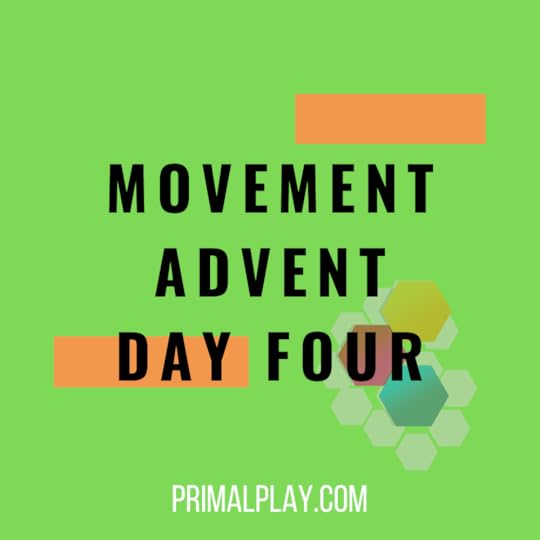
Have fun with playful movement snacks!
December 2, 2024
Movement Advent 2024 Day Three

Movement Advent 2024 - Fun Daily Movement
Primal Play Method Movement AdventDay 3: Shoulder Shoulder Knee Knee Taps
Welcome to Day 3 of our 24 Days of Movement Advent(ure)! 🎄
This festive season, we’re making movement joyful, energising, and impactful with playful, bite-sized movement snacks. Each day brings a new opportunity to reconnect with your body, improve your fitness, and embrace the powerful benefits of playful movement. Today’s featured exercise, Shoulder Shoulder Knee Knee Taps, is a fantastic way to blend coordination, cardiovascular endurance, and cognitive stimulation into a fun, rhythmic activity.
This movement is not only engaging but also highly effective. It challenges your ability to stay in sync with a rhythmic tempo, pushing your mind and body to work in harmony. As you tap your shoulders and knees in a dynamic pattern, you’ll activate multiple muscle groups while giving your brain a powerful workout. Research shows that combining rhythm and coordination like dancing improves neuroplasticity, memory, and mental sharpness, making this exercise as beneficial for your mind as it is for your body.
The beauty of Shoulder Shoulder Knee Knee Taps lies in its adaptability. Whether you’re moving at a steady pace or challenging yourself to match the beat of faster music, this exercise offers a playful yet impactful way to boost your overall fitness. Plus, it’s an excellent way to inject some energy and fun into your day—perfect for breaking free from holiday stress or sedentary habits.
So, are you ready to unlock your full potential with this Primal Play Method® challenge? Let’s dive into Day 3 and discover how a simple rhythm-based exercise can transform the way you think and move. Get ready to move to the beat, sharpen your focus, and feel more energised than ever!
Why Participate in the Movement Advent(ure)?The 24 Days of Movement Advent(ure) is more than a fitness challenge—it’s a celebration of the joy and benefits of movement. These short, impactful exercises align with the Primal Play Method®, combining physical fitness with mental wellness in a way that’s accessible for everyone.
“It’s time for a movement snack!”Day THREE: Movement Advent ChallengeToday’s Movement ChallengeShoulder Shoulder Knee Knee Taps
Time to Play: 30-60 seconds
1️⃣ Start in a standing position with a relaxed posture.
2️⃣ Tap your right hand to your left shoulder, then your left hand to your right shoulder.
3️⃣ Follow by tapping your right hand to your right knee, then your left hand to your left knee.
4️⃣ Keep repeating the pattern, increasing your pace as the tempo of the music speeds up.
This movement combines physical and mental benefits, making it an excellent choice for boosting both body and brain:
Cognitive Function: The coordination required helps improve neural connections, sharpening focus and memory.
Cardiovascular Endurance: Moving at a quick tempo elevates your heart rate, promoting cardiovascular health.
Coordination: Alternating between shoulders and knees challenges your rhythm and reflexes, improving overall motor skills.
By syncing movement with music, this exercise also taps into the power of rhythm, which research shows can enhance brain function and mood.
Level Up Your Practice🆙 For an extra challenge:
Bring your knees higher for greater core engagement.
Tap higher on your shoulders or lower on your knees to increase the range of motion.
Try closing your eyes briefly to further test your coordination and balance.
🌟 Looking for a gentler option?
Reduce the pace and focus on precise, deliberate taps.
Share Your ProgressHow did you fare with today’s rhythmic challenge? Share your experiences on social media using #MovementAdvent2024 and tag me on Instagram (@fitnessexplorer). Let’s celebrate the joy of playful movement together and inspire others to join in!
RELATED: Unlock The Power of Play for Health and Happiness WANT TO PLAY MORE?Sign up with your best email address to receive news and special offers—get 2 FREE eBooks “The Importance of Play" and “Animal Moves Sampler”.
Email Address SEND ME MY GOODIES!Bonus 1: FREE Movement is Medicine printable PDF.
Bonus 2: No Play, No Gain research article PDF
LOOKING FOR MORE PLAYFUL WAYS TO MOVE?
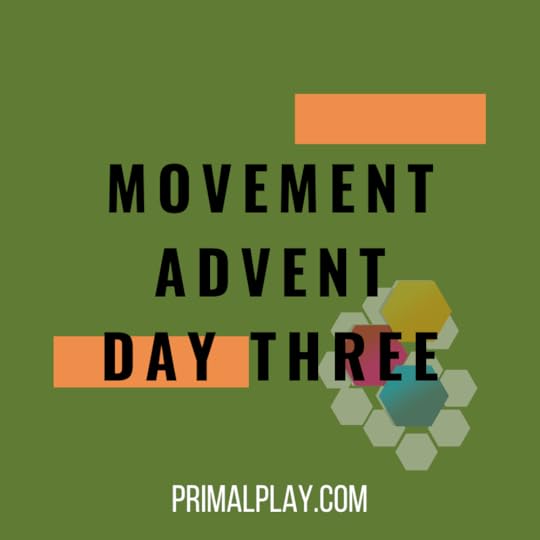
Have fun with daily, playful movement snacks!
December 1, 2024
Movement Advent 2024 Day Two

Movement Advent 2024 - Fun Daily Movement
24 Days of Movement Advent(ure)Welcome to Day 2 of our 24 Days of Movement Advent(ure)! 🎄
This festive season is the perfect time to embrace movement as a source of energy, joy, and well-being. Each day, we bring you a playful, bite-sized challenge to inspire your body to move, uplift your mind, and keep you feeling vibrant and active amidst the holiday hustle. These short and engaging exercises are designed for all fitness levels, so whether you're just starting your movement journey or you're already a seasoned mover, there's something here for you.
Today’s movement challenge is all about unlocking the magic of coordination, mobility, and strength—three essential ingredients for a healthy, functional body. By combining these elements in a fun, interactive way, you'll not only build physical fitness but also improve your ability to move with ease and confidence in daily life.
Let’s dive into today’s star move: Crab Knee Taps! 🦀 This playful and energising exercise is a fantastic way to activate your core, strengthen your shoulders and glutes, and increase your overall flexibility. Plus, it’s an excellent opportunity to challenge your coordination as you alternate taps between opposite hands and knees. Simple to learn and endlessly adaptable, it’s a movement that truly embodies the playful spirit of the Primal Play Method®.
Get ready to wake up your muscles, stretch your limits, and start Day 2 with a burst of fun-filled activity. Let’s move!
Why Participate in the Movement Advent(ure)?This 24-day series is a playful way to stay active, relieve stress, and discover the joy of movement during the holidays. These short daily challenges align with the principles of the Primal Play Method®, combining physical fitness with mental wellness in a way that’s accessible for everyone.
“It’s time for a movement adventure!”— Anon Day TWO: Movement Advent ChallengeToday’s Movement Challenge
CRAB KNEE TAPS
Time to Play: 30-60 seconds
1️⃣ Start in a crab position: sit on the floor, hands behind you, feet planted, and hips lifted off the ground.
2️⃣ Raise your right hand and tap your left knee.
3️⃣ Return your hand and foot to the floor.
4️⃣ Switch sides: raise your left hand and tap your right knee.
⏱ Keep alternating sides for the set time, aiming for smooth, controlled movements.
Why This Move?Why Try This?Today’s movement is a fantastic way to develop:
Coordination: Engaging multiple limbs in a rhythmic pattern challenges your brain and body connection.
Mobility: The crab position improves shoulder, wrist, and hip flexibility.
Strength: Supporting your bodyweight targets your core, shoulders, and glutes.
Level Up Your Practice🆙 For an added challenge:
Perform the taps more slowly, keeping your hips lifted and stable.
Raise your knees higher for an extra core workout.
🌟 Need a gentler option?
Lower your hips slightly for more support or tap your knees without fully lifting your hands off the floor.
💬 Your Turn!
Try today’s challenge. How many rounds can you complete today?
Share Your Progress
How did you find today’s challenge? Share your experience on social media using #MovementAdvent2024 and tag me on Instagram (@fitnessexplorer)! Let’s inspire others to join the fun and embrace the joy of movement this holiday season.
RELATED: How To Develop A Playful Approach To Life WANT TO PLAY MORE?Sign up with your best email address to receive news and special offers—get 2 FREE eBooks “The Importance of Play" and “Animal Moves Sampler”.
Email Address SEND ME MY GOODIES!Bonus 1: FREE Movement is Medicine printable PDF.
Bonus 2: No Play, No Gain research article PDF
LOOKING FOR MORE PLAYFUL WAYS TO MOVE?
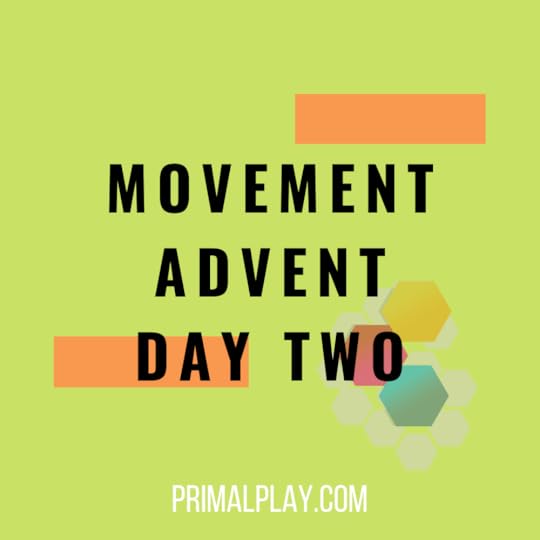
Have fun with daily, playful movement!
November 30, 2024
Movement Advent 2024 Day One

Movement Advent 2024 - Fun Daily Movement
24 Days of Movement Advent(ure)As the holiday season begins, let’s embrace a playful and energising tradition: 24 days of Movement Advent(ure)! 🎄
Each day, I’ll share a bite-sized movement challenge designed to engage your body and mind, bringing a spark of fun to your daily routine. These 30 to 90-second movement snacks are quick, effective, and packed with the mental and physical benefits of staying active. From improving coordination and agility to relieving stress and boosting energy, these playful movements align with the principles of the Primal Play Method®—helping you rediscover the joy of movement.
Whether you’re a long-time reader of PrimalPlay.com or a newcomer looking for fresh ideas to stay active, this series is for everyone. You’ll find all 24 videos posted daily, with easy-to-follow steps in each blog post. If you’re new to Primal Play, read more about how active play boosts adult health and happiness to see why play is a game-changer for well-being.
Why Participate?Mental Health Benefits: Reduce stress and sharpen focus during the busy holiday season. Did you know play also enhances the release of feel-good hormones like serotonin and dopamine?
Physical Benefits: Boost coordination, agility, and strength with simple yet effective movements. If you’re looking for fun alternatives to workouts, learn about five reasons to playout instead of workout.
Playful Fitness: Experience the essence of the Primal Play Method—because movement should be as enjoyable as it is beneficial! For more reasons to move, check out the amazing benefits of physical activity.
Join me each day for a new challenge, and let’s make this December a celebration of playful, purposeful movement. For some bonus movement, try the Bear Crawl or the Duck Walk, two playful moves.
👉 How to Engage:
Please bookmark this page or subscribe to the email list to avoid missing a day.
Share your progress on social media using #MovementAdvent2024, and encourage friends and family to join the fun.
Tag me on Instagram, and let me know how you’re finding the challenges!
Are you ready to move with me? Let’s make this December more active, joyful, and connected—one hop, jump, and playful move at a time!
“It’s time for a movement adventure!”— Anon Day One: Movement Advent ChallengeMovement Advent Day One: Time to Play!
🌀 Today's Challenge: Coordination & Agility Boost
🦵 Hop x 4 (Right Leg)
🌪 Kriss Kross x 2 (Behind, In Front)
🦵 Hop x 4 (Left Leg)
🌪 Kriss Kross x 2
Repeat for 30 seconds, moving smoothly through each step. Keep the rhythm playful and fun!
Why This Move?Today’s challenge focuses on agility and coordination—two key elements for better movement and reaction time. These simple moves help refine your motor control, making everyday movements smoother and more efficient.
🆙 Want to Level Up?
Speed up the sequence, hop on the balls of your feet, or raise the intensity of your Kriss Kross moves. Feel free to explore variations to keep things dynamic!
💬 Your Turn!
Try today’s challenge. How many rounds can you complete today?
Share this with a friend who needs a boost of playful movement today!
Stay tuned for tomorrow’s movement challenge! Make sure you’ve subscribed to the blog or our email list so you don’t miss a single day of this advent adventure. Don’t forget to share the fun with friends and family—it’s always better together!
RELATED: How To Develop A Playful Approach To Life WANT TO PLAY MORE?Sign up with your best email address to receive news and special offers—get 2 FREE eBooks “The Importance of Play" and “Animal Moves Sampler”.
Email Address SEND ME MY GOODIES!Bonus 1: FREE Movement is Medicine printable PDF.
Bonus 2: No Play, No Gain research article PDF
LOOKING FOR MORE PLAYFUL WAYS TO MOVE?
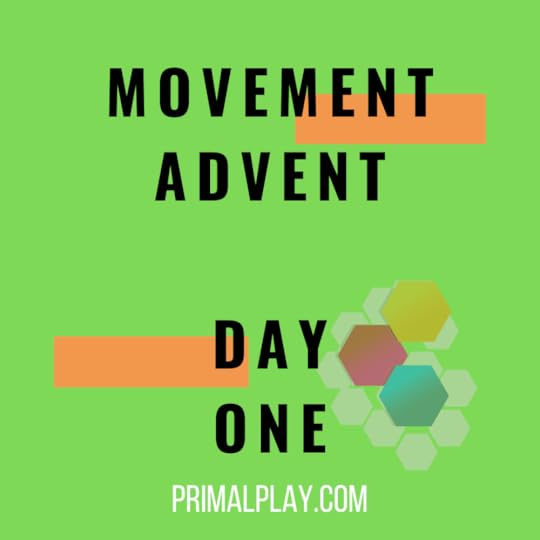
Have fun with daily, playful movement!
April 21, 2024
Stuart Brown Testimonial
“What a rare combination of talent that was!”— Stuart Brown A DAY OF PLAY
In an inspiring afternoon at the USA Play Coalition annual conference, I had the privilege of witnessing Darryl Edwards, a pioneer in the field of play, deliver a compelling presentation on the essence of play and its profound impact on our lives. Darryl's ability to articulate the complexities of play and his unique approach to engaging the audience made for an enlightening and enriching experience.
The Essence of Play UnveiledPlay is a concept that often eludes definition, residing in the realm of experience rather than words. Yet, Darryl Edwards masterfully navigated this challenge, offering a clear and organised exposition of what play is and its significance for personal enrichment and cognitive enhancement. His presentation went beyond the cognitive, inviting the audience to understand play intellectually and embody it.
Engaging the Body and MindWhat set Darryl's presentation apart was his innovative method of involving the audience. Through a series of clever and inclusive activities, he transformed the audience from passive listeners to active participants. This immersive approach allowed everyone present to experience firsthand the joy and benefits of play. It was a vivid demonstration of how play can enrich our lives, increase brain size, and contribute to our overall well-being.
A Rare TalentWatching Darryl Edwards in action, one can't help but admire his dual ability to define play and demonstrate it through his own actions. It's a rare talent to not only talk about play but to bring it to life, ensuring that the audience doesn't just understand the concept but experiences it deeply. This unique blend of knowledge and practical engagement makes Darryl's approach to play so effective and memorable.
A Memorable AfternoonThe afternoon spent at the USA Play Coalition was more than just an educational experience; it celebrated play in its purest form. Darryl Edwards did not just speak about play; he brought it into the room, making it a tangible, shared experience. It was a powerful reminder of play's essential role in our lives, offering joy and a pathway to greater health and cognitive function.
As we reflect on the day's events, it's clear that Darryl Edwards' presentation was not just about defining play but about living it. His ability to engage, inspire, and educate is a testament to his passion and expertise in the field of play. It was, indeed, a great afternoon, one that will continue to inspire and influence our understanding and practice of play.
Thank you, Darryl, for a truly remarkable experience.
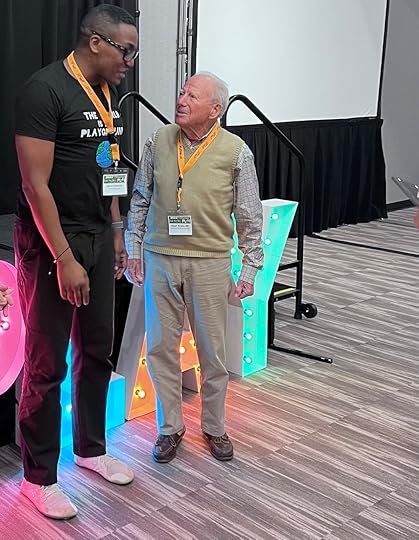
Darryl Edwards speaking with Dr Stuart Brown about Play.
RELATED: Five Reasons You Should Playout Instead of Workout
Stuart Brown, MD, is an acclaimed author and physician, best known for his insightful book "Play: how it shapes the brain, opens the imagination, and invigorates the soul". With a background in medicine and psychiatry, Dr. Brown has emerged as a pioneering researcher on the role of play in human development and its importance across the lifespan. He founded the National Institute for Play, an organisation dedicated to bringing the transformative power of play into public consciousness and medical practice. His work, blending rigorous scientific research with practical applications, has made significant contributions to understanding how play can be used as a vital tool for learning, expression, and problem-solving. A graduate of Cornell University Medical College and a retired clinical professor at Stanford University, Dr. Brown's unique perspectives on play have influenced educators, therapists, and social planners around the world.Unlock the secrets to a joyful and active life now! Download the FREE Importance of Play and Animal Moves Sampler eBooks. Dive into the world of play today and transform your routine with fun and movement. Don't miss out—your journey to a more playful life is just a click away!
Get your FREE ebooks on "The Importance of Play" & "Animal Moves Sampler"Sign up with your best email address to receive news and special offers.
Email Address SEND ME MY EBOOKS!Bonus 1: FREE Movement is Medicine printable PDF.
Thank you!RELATED POSTS:
November 5, 2023
Unlock the Power of Play: How Active Play Boosts Adult Health & Happiness
“Active play is the gateway to rediscovering our innate joy in movement and the key to unlocking a healthier, happier adult life.”— Darryl Edwards Unleashing the Primal Power of Play: A Blueprint for Adult Vitality
Do you think that play is a frivolous activity with no real value? Well, in the heart of every grown-up beats the pulse of a child at play. The notion that play is a domain reserved for the playground is not just outdated—it is a misconception that could be costing us our health. There are many benefits of play in adults.
At PrimalPlay.com, we champion the primal instinct to play at any age, and the evidence is mounting in support of this philosophy. Let us dive into the myriad ways that active play can revolutionise adult lives, backed by solid evidence looking at the importance of play for health.
The Primal Need for Play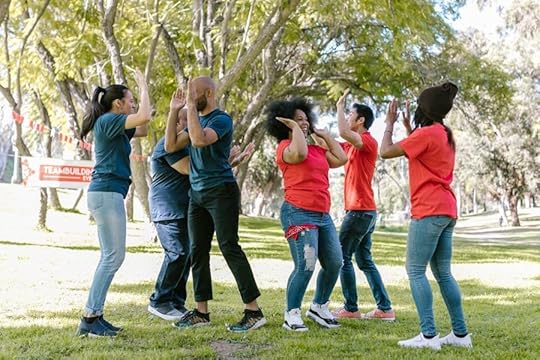
Adults engaging in playful activities for health
In the relentless pursuit of productivity, health and success, the modern adult often neglects a primal component of our essence—play. The notion that play is reserved for the young is a cultural construct that belies our biological need for play at every age. The American Journal of Play illuminates this with compelling evidence, indicating that adults who regularly engage in play are not just happier but also exhibit marked improvements in a range of cognitive functions, including creativity, problem-solving, and emotional regulation (Brown, 2009).
This is not a new concept; our ancestors knew the value of play. It is etched in our DNA, a throwback to the days when physical play was not just for enjoyment but a means of survival, honing the skills necessary for hunting and community bonding. In the modern context, while we may not need such skills to survive, the benefits of play remain deeply ingrained in our biology and are just as relevant.
Active play is a potent antidote to the sedentary lifestyle that has become synonymous with contemporary adult life. It is a way to counteract the hours spent in front of screens, in meetings, or on the daily commute. It is a catalyst for physical health, certainly, but its impact transcends the physical realm. When we engage in play, we activate parts of the brain associated with pleasure, creativity, and problem-solving. It is a natural and necessary mental exercise that keeps our brains flexible and youthful.
Play For Emotional Well-Being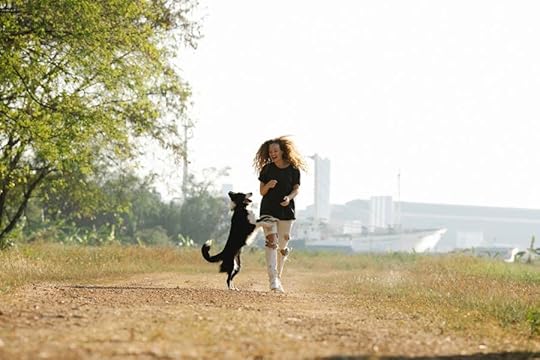
An adult at play running with her dog.
Play is a powerful tool for emotional well-being. It is a form of expression, a release valve for stress and tension. In play, we often achieve a state of flow, that immersive and focused state of mind where time seems to stand still, and we are entirely present in the moment. This state, as described by psychologist Mihaly Csikszentmihalyi, is not only associated with increased performance in various fields but is also a source of profound happiness and fulfilment.
The benefits of play are not merely anecdotal; a growing body of research backs them. A study published in the Journal of Workplace Learning found that employees who experienced playful activities at work reported higher levels of job satisfaction and innovation (Proyer, 2012). This suggests that play is beneficial for individuals and can have a positive impact on organisational culture and performance.
In essence, play is not a luxury; it is a necessity—a fundamental aspect of our well-being that we cannot afford to overlook. As we navigate the complexities of adult life, making time for play is not regressing to childhood; it is embracing a vital part of our humanity. It is about allowing ourselves to explore, experiment, and feel joy and wonder. It is about living fully, not just efficiently.
The primal need for play is as relevant today as ever. It is an essential thread in the fabric of human health and happiness, one that weaves together the physical, cognitive, and emotional strands of our lives.
By weaving play back into the fabric of our daily lives, we don't escape adulthood; we elevate it, transforming our existence to be not only productive but also vibrantly playful, not merely endurable but deeply joyful. Embracing our inner child is optional, but unleashing the transformative power of play is essential for a life truly well-lived.
RELATED: Five Reasons You Should Playout Instead of Workout
Physical Fitness: The Playful Pathway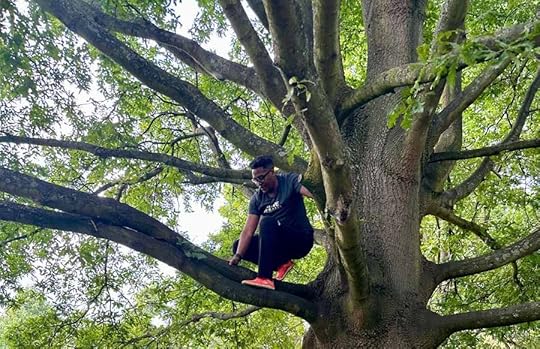
Darryl Edwards—climbing a tree in his local London park (otherwise known as his playground).
What about those who argue that physical fitness can only be achieved through rigid workout routines and gym memberships?
Well, there is a more instinctual, joyous route to achieving health and vitality: through play. When we engage in active play—be it a spontaneous game of tag, some roughhousing, or climbing a tree—we are participating in a form of movement that is both ancient and deeply satisfying. We can feel more energised and focused throughout the day.
This playful approach to movement is more than just a nostalgic nod to our childhoods; it is a powerful means of enhancing our physical well-being. A study featured in the Journal of Exercise Nutrition & Biochemistry underscores this, revealing that exercise which embodies the spirit of play can lead to marked improvements in cardiovascular health, muscle fortitude, and suppleness of movement (Kim & Lee, 2014). Such activities are not merely workouts; they are holistic experiences that engage the body dynamically and adaptively, much like our hunter-gatherer ancestors who ran, leapt, and played as a way of life.
The World Health Organization (WHO) has laid down guidelines that suggest adults aged 18–64 should aim for at least 150 minutes of moderate-intensity aerobic physical activity with at least two days of resistance training throughout the week. Active play can align perfectly with these recommendations, offering a refreshing alternative to structured exercise regimes. It is a way to weave the recommended physical activity into our lives without the monotony that sometimes accompanies traditional fitness programs.
Active play and well-beingActive play is versatile and can be tailored to individual preferences and capabilities. It can range from light-hearted physical games to more intense physical challenges, which can elevate the heart rate and challenge the body in various ways. This versatility ensures that play can be a source of fitness for everyone, regardless of age, mobility or athletic ability.
The playful pathway to fitness is not just about the physical benefits. It's about the joy of movement, the thrill of competition, and the laughter shared between friends. It is about the rush of endorphins that flood our system after a spirited chase or the satisfaction of a well-played game. These emotional and psychological rewards can often lead to a more consistent and long-term commitment to staying active, which is crucial for maintaining physical health over a lifetime.
Incorporating play into our fitness routine can transform the way we view exercise. Instead of viewing it as a chore or a necessary evil, it becomes a source of pleasure and excitement. It is a shift in perspective that can make all the difference in sustaining an active lifestyle. By engaging in play, we're not just meeting health guidelines; we are embracing a way of life that celebrates movement, camaraderie, and the sheer joy of being alive.
In essence, the playful pathway to physical fitness is about reconnecting with the fundamental human joy of movement. It is about balancing structure and spontaneity, effort and enjoyment. As we integrate play into our lives, we do more than improve our physical health; we nurture our innate love for movement, and in doing so, we enrich our lives. We should substitute more playouts for workouts.
RELATED: Play And The Feel Good Hormones
Mental Health: The Joy of Play
Adults At Play
The tapestry of mental well-being is woven with various threads, one of the most vibrant among them being play. The mental uplift from engaging in playful activities is not just anecdotal; it is a phenomenon increasingly observed and documented in scientific literature. For instance, the Journal of Happiness Studies published findings that adults who partake in physical play not only enjoy reductions in stress levels but also significant enhancements in overall mood (Proyer, 2013).
This is attributed to the release of endorphins, often referred to as the body's natural mood elevators, which are triggered by physical activity. These hormones are powerful, fostering an elevated state of mind and creating a sense of joy that permeates beyond the playground or field.
The implications of these findings are profound, especially in a world where mental health challenges are widespread. Play, with its inherent joyfulness and spontaneity, acts as a natural antidote to the pressures of modern life. Play provides a respite, a mental oasis where the mind can wander away from the stresses of daily routines.
The act of play, whether a game of tag, a dance class, or an impromptu game of frisbee, becomes a form of active meditation, allowing for a mental reset. It is a time when the mind can focus on the here and now, engaging fully in the moment, which is a known balm for anxiety and stress. The social aspect of play can amplify these mental health benefits.
Group activities can foster a sense of belonging and community, which is crucial for emotional support and resilience. The shared experiences and camaraderie that come from active play contribute to a sense of social connectedness, combating feelings of isolation and loneliness that often accompany mental health struggles. This social synergy, combined with the endorphin rush of physical exertion, makes play an influential, multifaceted contributor to mental and emotional well-being. It is a reminder that joy can be found in the simple act of play and is a fundamental pillar of health.
RELATED: Have more fun with fitness!
Cognitive Benefits: Play to Learn
A family at play healthy for their minds and bodies.
Play extends beyond physical exertion; it is a cerebral exercise that can sharpen the mind and enhance cognitive capabilities. The Journal of Neuroscience offers compelling evidence that physical activity, often inherent in play, is not just beneficial for the body but also for the brain. It suggests that such movement can stimulate neurogenesis—the birth of new brain cells—thereby contributing to improved cognitive functions (van Praag, 2009). This process is akin to equipping the brain with a new set of tools to navigate the complexities of life.
Active play is a catalyst for cognitive growth, enhancing memory, attention, and problem-solving skills. Play enables you to develop a growth mindset. It's a form of mental conditioning that prepares the brain for the varied cognitive challenges it encounters daily.
The cognitive benefits of play are multifaceted. They extend to the realm of creativity and innovation, where the unstructured nature of play allows the mind to explore and experiment without the fear of failure or the constraints of conventional thinking. This freedom is fertile ground for developing creative thought processes and novel idea generation.
As adults engage in play, they often find themselves in a state of flow where time seems to stand still and the mind operates at its peak. This state not only enhances immediate cognitive function but can also lead to long-term improvements in brain health. By regularly engaging in play, adults can foster a more agile and resilient mind, capable of learning and adapting throughout the lifespan.
Social Bonds: The Teamwork of Play
Adults at Play in an Office Environment
The fabric of human connection is often woven through shared experiences, and play is one of the most vibrant threads in this social tapestry. The Journal of Social and Personal Relationships underscores the value of play in fostering deeper connections, revealing that adults who participate in collective play activities tend to develop stronger bonds of trust and cooperation (Magnuson & Barnett, 2013). This is particularly evident in group games, where individuals must work in concert towards a common goal, often leading to a sense of camaraderie and collective achievement.
Group dance classes offer rhythmic synchrony that can transcend verbal communication, allowing participants to connect on a primal and emotional level. These shared playful experiences act as social glue, creating a sense of belonging and community essential for emotional well-being. The act of play in a social context can serve as a powerful antidote to the isolation and loneliness that are all too common in adult life.
In the give and take of a game or the mutual support of a team, individuals find not just enjoyment but also a sense of purpose and place within a group. Playful interactions can break down barriers, encourage open communication, and foster an inclusive environment where diversity is celebrated and individual strengths are recognised. As adults engage in these social play activities, they often rediscover the joy of being part of a community, rekindling old friendships and sparking new ones.
Play is not just a pastime but a vital component of building and maintaining the social networks crucial for a fulfilling life. Play keeps you healthy but also creates connections.
Incorporating Play into the Adult Routine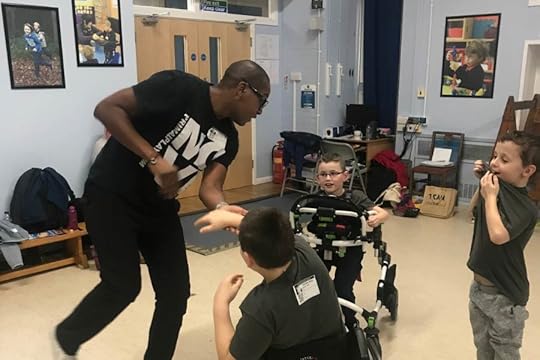
Darryl Edwards Playing an Inclusive Game of Primal Play Tag With Kids
Knowing the benefits of play is one thing; integrating it into a busy adult life is another. Here's how you can weave the joy of play into your daily fabric:
Prioritise Play: Mark it in your calendar as you would any important appointment. Early morning, lunchtime breaks or evening sessions can become sacred playtime. Setting aside a specific time each week for play helps ensure it happens.
Play at Work: Introduce standing desks, walking meetings, or playful team-building exercises. These not only break the monotony but also invigorate the mind and body.
Social Play: Join a local sports club, take up a new hobby such as dancing, or throw a frisbee in the park with friends. Social play magnifies the benefits by combining physical activity with laughter and camaraderie. If you'd like to try something different, give Primal Play Method Crab Foot Tag a go!
Variety is the Spice of Play: Explore different activities—cycling, sprinting, tree climbing, or martial arts. Find what resonates with you and ignites that spark of joy.
The Many Faces of PlayPlay comes in many forms, and there's a type for every personality:
Primal Play Method Games: Play out with new challenges by trying games such as Sticky Shoulders or Plank Tennis.
Improv and Theatrics: Engage in improvisational theatre or dance. It's not just an art form but a dynamic way to enhance physical play and cognitive agility.
Classic Games: Revisit childhood favourites like tag or hide-and-seek. They're not just nostalgic; they're a fantastic way to get your heart racing and your body moving.
Outdoor Adventures: Nature's playground offers endless opportunities for active play. Hiking, kayaking, or even gardening can be playful and profoundly satisfying.
Animal Moves: These practices blend the physical and mental, improving mobility and reducing stress through focused, playful movements. There are many health benefits to playing with Animal Moves.
Strength Training: Lifting your friends as weights or bodyweight exercises can be playful, too. Challenge yourself, set goals, and celebrate achievements in a playful spirit.
Play's Role in Personal Development
Skateboarding is one example of how to incorporate play into adult life
Play is beyond a simple diversion; it is a dynamic catalyst for personal growth and development. The Harvard Business Review illuminates the role of play as a driver of innovation, positing that playful activities stimulate the kind of out-of-the-box thinking that is foundational to problem-solving and creativity (Mainemelis & Ronson, 2006). When adults engage in play, they often allow themselves to take risks and experiment in ways that the structured environments of work and daily responsibilities do not permit.
The freedom of play can lead to the discovery of new talents and the refinement of existing skills, fostering a growth mindset that is invaluable in personal and professional realms. Play provides a safe space to fail and learn from mistakes, a critical aspect of personal development. It is in the midst of play that adults can challenge their boundaries, push their limits, and emerge with a stronger sense of self and a clearer vision of their capabilities.
Additionally, play is a nurturing ground for creativity, allowing the imagination to roam freely without the constraints of practicality or the fear of judgment. This is where new ideas are born and where innovation can flourish. The Harvard Business Review's insight into play's role in personal development suggests that those who play regularly are more likely to develop resilience and adaptability—essential traits in an ever-changing world (Mainemelis & Ronson, 2006).
Through play, adults can revisit the curiosity and eagerness to explore that is often abundant in childhood but gets overshadowed by the seriousness of adult life. By re-engaging with this intrinsic part of human nature, adults can rejuvenate their enthusiasm for learning and open themselves up to a continuous journey of self-improvement and self-discovery.
Conclusion: The Call to PlaY FOR HEALTH AND HAPPINESSAmidst the relentless pace of adulthood, the fundamental essence of play has been overshadowed by a myriad of obligations and societal expectations. Yet, it is imperative to acknowledge that play is not merely an indulgence reserved for the young; it is an indispensable component of a wholesome life. Reintegrating play into the fabric of our adult lives is not just beneficial—it's essential for our holistic well-being.
Play is a call to reclaim the joyous rebellion against the drudgery of routine, to rediscover the exuberance that play instils within us. The playground of life, vast and varied, beckons to us all, inviting us to partake in its boundless offerings. It's a universal space where laughter resonates, spirits soar, and the heart finds its rhythm in the pure delight of movement and connection.
Key Takeaways:Active play is a cornerstone of physical health, acting as an antidote against the tide of chronic health conditions that threaten our vitality.
Play is a natural medicine for the mind, dispelling stress clouds and nurturing our mental and emotional landscapes.
Play is the glue that binds the social fabric, fostering a sense of unity and enriching our communal experiences.
Incorporating play into the daily grind can be seamlessly achieved, with profound implications for our overall quality of life.
The spectrum of active play is as diverse as it is inclusive, offering a plethora of options to ignite the spark of joy in movement for everyone.
Play is the enduring engine of growth and development, propelling us forward through all the seasons of life.
In embracing the full spectrum of play, we not only enhance our own lives but also contribute to a more vibrant, connected, and joyful community. Let us redefine the contours of adulthood, infusing it with the spirit of play—one game, one laugh, one jubilant leap at a time.
REFERENCESBrown, S. (2009). Play: How it Shapes the Brain, Opens the Imagination, and Invigorates the Soul.Kim, Y. & Lee, J. (2014). Physical activity and muscle strength synergistically improve bone health in rats. Journal of Exercise Nutrition & Biochemistry.Proyer, R. T. (2013). Playfulness in adults revisited: The signal theory in German speakers. Journal of Happiness Studies.van Praag, H. (2009). Exercise and the brain: Something to chew on. Journal of NeuroscienceMagnuson, C. D., & Barnett, L. A. (2013). The playful advantage: How playfulness enhances coping with stress. Leisure Sciences.Mainemelis, C., & Ronson, S. (2006). Ideas are born in fields of play: Towards a theory of play and creativity in organisational settings. Harvard Business Review.World Health Organization. (2020). Global recommendations on physical activity for health. Edwards, D. (2018). Animal Moves: How to move like an animal to get you leaner, fitter, stronger and healthier for life. London: Explorer PublishingUnlock the secrets to a joyful and active life now! Download our FREE Importance of Play and Animal Moves Sampler eBooks. Dive into the world of play today and transform your routine with fun and movement. Don't miss out—your journey to a more playful life is just a click away!
Get your FREE ebooks on "The Importance of Play" & "Animal Moves Sampler"Sign up with your best email address to receive news and special offers.
Email Address SEND ME MY EBOOKS!Bonus 1: FREE Movement is Medicine printable PDF.
Thank you!RELATED POSTS:
January 8, 2023
Be More Active: 10 Reasons for Playing This Year
“Play is the bridge that connects us to our inner child, no matter how old we are!”— Darryl Edwards
Playing games is an activity that is enjoyed by both children and adults alike.
Unfortunately, many of us are so caught up in the hustle and bustle of everyday life that we need to remember to make time for play. But play has countless benefits, from promoting physical health to stimulating mental growth and creativity.
“Play is the highest form of research”— Albert Einstein
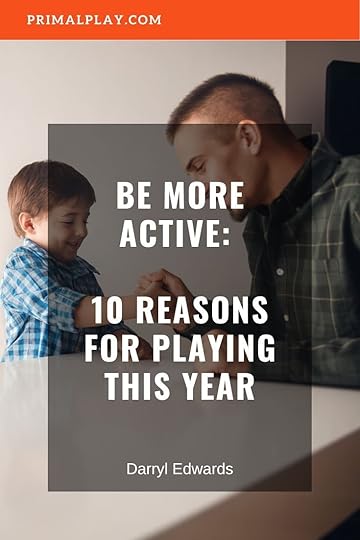
Playing is a powerful way to bring joy into our lives and create memories that will last a lifetime!
Here are ten reasons why everyone should find time to play more often!
#1: Play improves physical healthWhen children (and adults!) play outside, engage in rough and tumble play or participate in competitive team sports, they become more active and improve their physical strength, endurance, and agility. These activities also help increase physical levels and burn far more calories than sitting still. Even playing a game of tag could lead to improved physical benefits and can even help to reduce childhood levels of obesity.
In addition, regular movement reduces the risk of developing heart disease, diabetes, and other chronic illnesses. Another benefit to your physical health is improved coordination, which can help athletes, dancers, and everyone else moves with greater ease and agility. Finally, playing is a fun way to incorporate exercise into your day and can even help reduce stress levels.
Playing together with others encourages socialisation skills such as communication, collaboration, and cooperation, which are essential for healthy relationships in adulthood. It also allows children to form friendships with their peers more quickly—and having meaningful relationships can help reduce stress levels throughout life.
It is also suitable for people struggling with shyness and low self-esteem to practice communicating and interacting in a safe environment.
#3: Play helps develop problem-solving skillsBy engaging in interactive games or puzzles, players can create strategies and find solutions while enjoying themselves! These skills are also beneficial throughout adulthood when taking on tasks at work or managing personal finances effectively. It also lets you start thinking outside the box and practising creative thinking.
Problem-solving can help you in various ways in everyday life, such as decision-making and creative thinking. With better problem-solving skills, you can also improve self-control and patience.
According to one study (“The Effect of Play on Convergent and Divergent Problem Solving”) from Canadian researchers at the University of Toronto and the University of Waterloo, play leads to the development of “divergent thinking". Divergent thinking is the ability to devise many independent solutions to the same problem.
RELATED: Five Reasons You Should Playout Instead of Workout
#4: Play boosts cognitive developmenTRecent studies suggest that there may be a connection between playing video games or board games regularly and enhanced cognitive abilities like better working memory, enhanced problem-solving skills, and improved concentration levels. Furthermore, playing certain types of digital games can even enhance spatial reasoning abilities! Playing in adults can also help improve memory and concentration levels.
#5: Playing reduces stress levelsResearch has found that play can help reduce stress levels, particularly in adults. Playing outdoors and engaging in physical activity releases endorphins (chemicals produced by the body) which act as a natural mood booster, reducing feelings of anxiety and depression.
In addition, playing games allows adults to take a break from their hectic schedules and focus on having fun! Finally, playing lets you wind down and relax, giving your mind a break from everyday stress and worries.
#6: Play fosters creativityThere's no denying how much fun it can be coming up with creative solutions during gameplay situations - especially when rewarded for doing so! With the right attitude towards gameplay failure (hint: don't take it too seriously!), players learn to think outside the box - a skill that comes quite handy during our daily lives too!
Being more creative can benefit you and your everyday life in several ways, including coming up with unique ideas, thinking ahead, and having the ability to adapt quickly. With creativity comes innovation, which can be applied to many aspects of life, whether at work or home.

Let's make 2023 about fun and exploring new possibilities through play!
#7: Play sharpens executive function skillsExecutive functions include essential abilities such as planning, setting goals according to priorities, or staying focused on tasks despite distractions, all crucial tools for success! Interestingly, research suggests a direct link between regular video gaming sessions and improved executive functioning abilities!
So, if you're looking for a way to get ahead, spending some time playing now and then might be a good idea. Play can help adults stay focused on tasks despite distractions, and it can also help in improving organisational skills and time management.
RELATED: Play And The Feel Good Hormones
#8: Playing aids self-discoveryWe're all different individuals with unique talents, and playing with others helps us explore our strengths further by experimenting with various roles we feel comfortable with. So never underestimate the power of playful discovery!
By being more relaxed through the play, you are more likely to learn more about yourself and your capabilities.
#9: Play increases emotional intelligenceOur emotions can affect virtually every area in our lives; thus, understanding them has become a highly valued skill set. From reducing stress levels effectively through relaxation techniques to being able to cheer ourselves up after a bad day, emotional intelligence helps us cope better with day-to-day problems. Therefore, playing "emotionally charged" video games should be part of everyone's routine. Video games can reduce stress, regulate our emotions and promote relaxation.
Emotional intelligence is also essential for managing relationships, and playing together helps us communicate better and understand each other more.
#10: Play boosts overall well-beingUltimately, by enriching our lives through entertainment while simultaneously obtaining physical, mental & emotional benefits – playing positively impacts our overall sense of well-being & happiness! And what could beat this?
Playing is an essential part of life that has numerous benefits and should be a top priority for everyone. It helps to reduce stress levels, improve cognitive development, foster creativity, sharpen executive function skills, aid in self-discovery, increase emotional intelligence and boost overall well-being. So whether you're playing video or board games with friends or family members, outdoor play with your kids, or interactive puzzles by yourself - it all counts!
RELATED: Have more fun with fitness!
With the right attitude towards gameplay failure (hint: don't take it too seriously!), players learn to think outside the box–a skill that comes quite handy during our daily lives too! In addition, playing together allows us to explore our strengths further by experimenting with various roles we feel comfortable with and understanding each other better through communication, which ultimately leads to increased emotional intelligence.
Those stuck in life or who want to try something new should give playing a chance. Through play, people can find joy and contentment that will help them make the most of their life experiences.
In conclusion, playing has numerous benefits that can positively impact people’s lives. Playing can help with physical, mental, and social development while also helping to create meaningful relationships. It is a great way to reduce stress, boost mood, and provide plenty of entertainment.
All these fantastic advantages make play so crucial for children and adults alike.
Researchers suggest that adults should get at least 30 minutes of physical activity per day for health and wellness maybe playing more could be one way to get there. If you want further information on why and how to get more play in your life, download The FREE Importance of Play eBook below and make sure you take some time out of your busy schedule in 2023 to play more–you won't regret it!
Get your FREE ebooks on "The Importance of Play" & "Animal Moves Sampler"Sign up with your best email address to receive news and special offers.
Email Address SEND ME MY EBOOKS!Bonus 1: FREE Movement is Medicine printable PDF.
Thank you!RELATED POSTS:
October 24, 2022
5 Reasons Why You Should Playout Instead of Workout
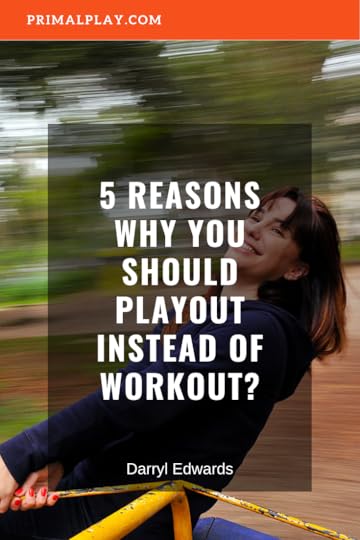
Playouts Are More Fun!
FIND WORKING OUT TOO MUCH OF A CHALLENGE?Do you workout? Or is there not enough time? Not the right equipment? No gym access? No motivation to exercise when it feels like a chore? No wonder many of us fail to do it.
As grown-ups, the fun in one’s movement or exercise practice often becomes secondary, and the results are primary. As adults, exercise is the means to this end, the end that focuses on avoiding the negatives around physical inactivity. As a result, the outcome and goals frequently set may neglect the ability to enjoy the process. But without joy, we have little access to intrinsic motivation and often give up.
But what if we could combine play with a regular exercise routine and make it fun, competitive, and social? We know regular physical activity is good for our health. What if we could achieve the results we have always wanted in less time while enjoying the process?
Why workout when you can playout?
“I have to exercise in the morning before my brain figures out what I’m doing.”— Anon

Kids finding time to playout!
1. Playouts Are Inherently More Fun!Cast your mind back to childhood moments when you ran around the playground. Better yet, can you recollect how you used to play and swing from one monkey bar to the next? Climb a tree or balance on a railing?
When we were kids, we loved to move—we ran, climbed, skipped, and jumped—and we called it PLAY because it was fun. We loved to move outside. These were helpful exercises that your young mind interpreted as delightful. However, the concept of fun and play may have changed for you as an adult, causing you to adopt strict exercising routines to keep fit.
Rather than working to achieve the desired end goal, play your way there! Lose yourself in the play, and the results will come naturally! There are ways to have more fun with fitness; however, playouts are one of the best ways to get there.
Are there more benefits from playouts than solely working out? Read on to find out more.
RELATED: How To Develop A Playful Approach To Life2. PLAYOUTS Reduce The Tendency For Snack Gratification.Research has revealed that most people feel entitled to unhealthy snacking after exercising. [3] One study found that the more fun people perceived the race to be during a competitive race, the less likely they were to compensate with a snack afterwards. Another study found that going for a scenic walk rather than walking for exercise led to a lower likelihood of selecting a dessert at mealtimes with less snacking during the day. [2]
This habit is a natural reaction triggered within moments of partaking in strenuous physical activity, deemed a reward for all the hard work. However, without significant willpower, this internal self-rewarding mechanism can be challenging. Unfortunately, it has been one of the most common reasons some people can’t stick to a schedule that will benefit them in the long run.
However, when the brain interprets these same activities as playouts or fun, there’s little room for hedonic hunger, which is the insatiable drive to seek pleasure from food, especially high-calorie, less-nutritious junk meals. Indeed, drawing the line between playout and working out can be challenging. However, the starting point is how you perceive the physical activity you’re engaged in. As a tip, you can commit to a daily dance routine to your favourite music that compels you to move vigorously and joyfully—reframing your movement around play and, as something fun, reduces compensation through food consumption. In addition, labelling an activity as fun may reduce the likelihood of compensating with food as a reward. In other words, you are less likely to “move more and eat more”.
RELATED: Why Play Is For Everyone3. PLAYOUTS decrease the heightened focus on weight loss.For many people, the focus of a workout is just to lose weight, which puts a lot of pressure on their mental health.
According to Ipsos, 45% of people globally are focused on losing weight.[5] In the USA, 62.9% of adults believe exercising is the most convenient way to achieve a healthy weight. [6] In the UK, a survey of over 2000 adults reported that over 70% of us are uncomfortable with our weight.
The evidence suggests that vigorous exercise helps maintain body composition, and higher intensity can reduce body fat. [1] The statistics demonstrate how many feel the pressure attached to their appearance rather than how they feel.
Fortunately, playouts reduce the focus and mental pressure as you gear your mental energies towards having fun and not just a routine to burn body fat. So, in the long run, you will improve your physical and psychological health without the burden of just thinking about how you look.
A playout helps you to focus on the moment more so than just the end result.
RELATED: Top 10 Benefits of Play4. Playouts are easier to incorporate as a routine.Unlike the demands to consciously fit workouts into your schedule, playout time can be flexible. You can playout anytime, anyplace and anywhere you choose. If you live with a friend or relatives, you can create competitive fun activities with them.
For example, whoever gets to perform the coin drop game five times without dropping any coins, earns the right to determine the next playout activity. It will be more fun to set healthy but enjoyable activity-filled conditions for the person who loses to do with you.
According to the activity engagement theory, [4] focusing on how enjoyable an activity is may increase intrinsic motivation and positively affect the desire to want to continue. As I often say, “play is not the activity but the attitude”. The mindset you bring to the activity makes all the difference.
WANT TO PLAY MORE?Sign up with your best email address to receive news and special offers—get 2 FREE eBooks “The Importance of Play" and “Animal Moves Sampler”.
Email Address SEND ME MY GOODIES!Bonus 1: FREE Movement is Medicine printable PDF.
Bonus 2: No Play, No Gain research article PDF
One outcome of taking part in exercise is dopamine release, one of the feel-good hormones—which governs how we respond to risk and reward. It is often termed the runners-high as it has a natural pain-relieving effect that makes our minds and bodies feel better post-activity.
However, there’s another critical hormone activated through play, which is serotonin. Serotonin is referred to as the happy hormone, and it’s released in the body through play, happy events, exciting memories, and fun-filled activities such as dancing. It also enhances communication between brain cells, enhancing cognitive function and improving focus and concentration. Furthermore, it improves digestion, regulates eating habits, and aids quality sleep. Serotonin positively impacts the entire body.
The next time you feel undecided about working out, turn it into a playout activity you’ll never tire of. Of course, there’s so much to benefit from exercising, but wouldn’t it be better to have fun while doing it? Hopefully, the reasons listed above will give you the push you need to get started.
Play. Doesn’t that sound like something you’d want to do regularly?
RELATED POSTS:
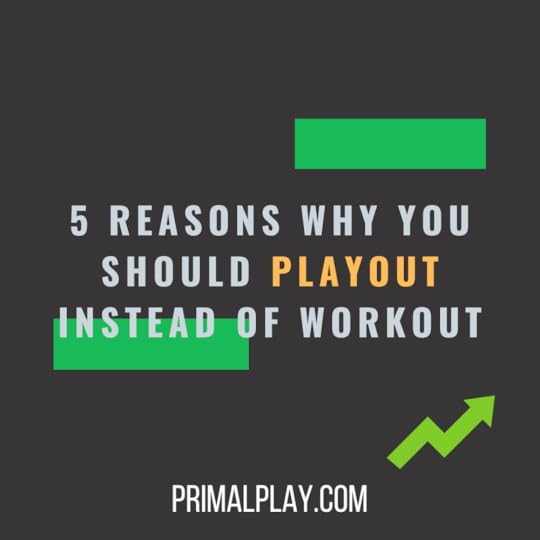
5 reasons why you should playout instead of workout!
REFERENCES:
[1] Guo, Wenji et al. “Physical activity in relation to body size and composition in women in UK Biobank.” Annals of epidemiology vol. 25,6 (2015): 406-413.e6. doi:10.1016/j.annepidem.2015.01.015
[2] Werle, Carolina O., et al. “Is It Fun or Exercise? the Framing of Physical Activity Biases Subsequent Snacking.” Marketing Letters, vol. 26, no. 4, 2014, pp. 691–702., https://doi.org/10.1007/s11002-014-93....
[3] Albarracin, Dolores et al. “Immediate increase in food intake following exercise messages.” Obesity (Silver Spring, Md.) vol. 17,7 (2009): 1451-2. doi:10.1038/oby.2009.16
[4] Higgins, E. T., & Trope, Y. “Activity engagement theory: implications of multiply identifiable input for intrinsic motivation.” In E. T. Higgins & R. M. Sorrentino (Eds.), Handbook of motivation and cognition: Foundations of social behaviour (Vol. 2, pp. 229–264). New York: Guilford Press.
[5] 45% Of People Globally Are Currently Trying to Lose Weight | Ipsos. https://www.ipsos.com/en/global-weight-and-actions.
[6] “Attempts to Lose Weight among Adults in the United States, 2013–2016.” CDC, 2019, www.cdc.gov/nchs/products/databriefs/db313.htm.
January 16, 2022
Appearance on BBC Two's - Inside The Factory
Summary only. Visit PrimalPlay.com for full links, other content, and more!
January 3, 2022
Benefits of Outdoor Physical Activity in Winter
Summary only. Visit PrimalPlay.com for full links, other content, and more!



